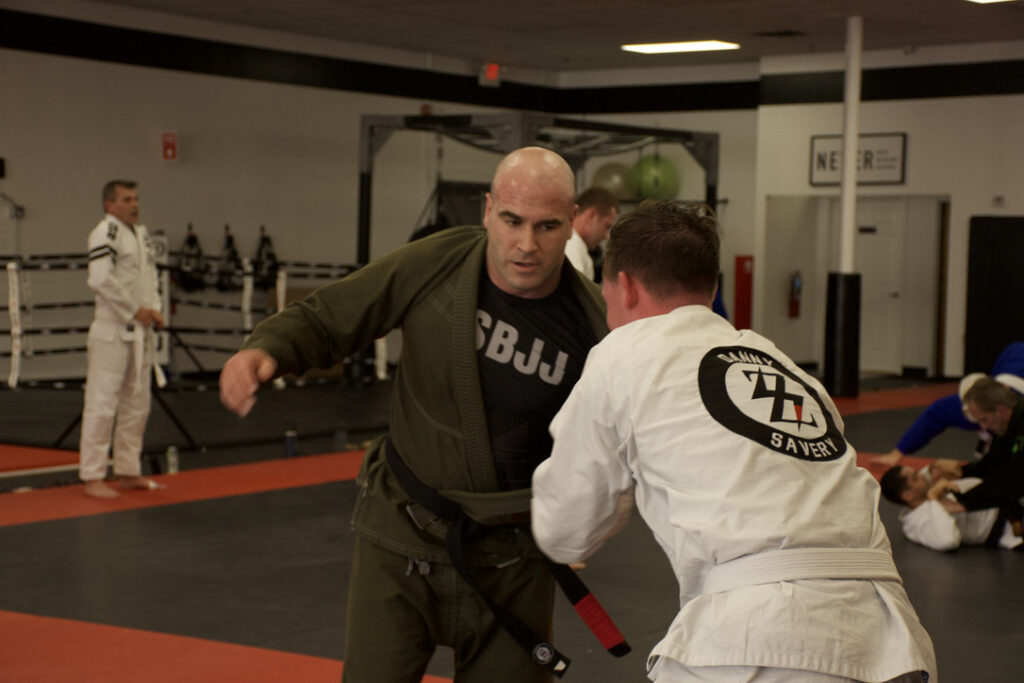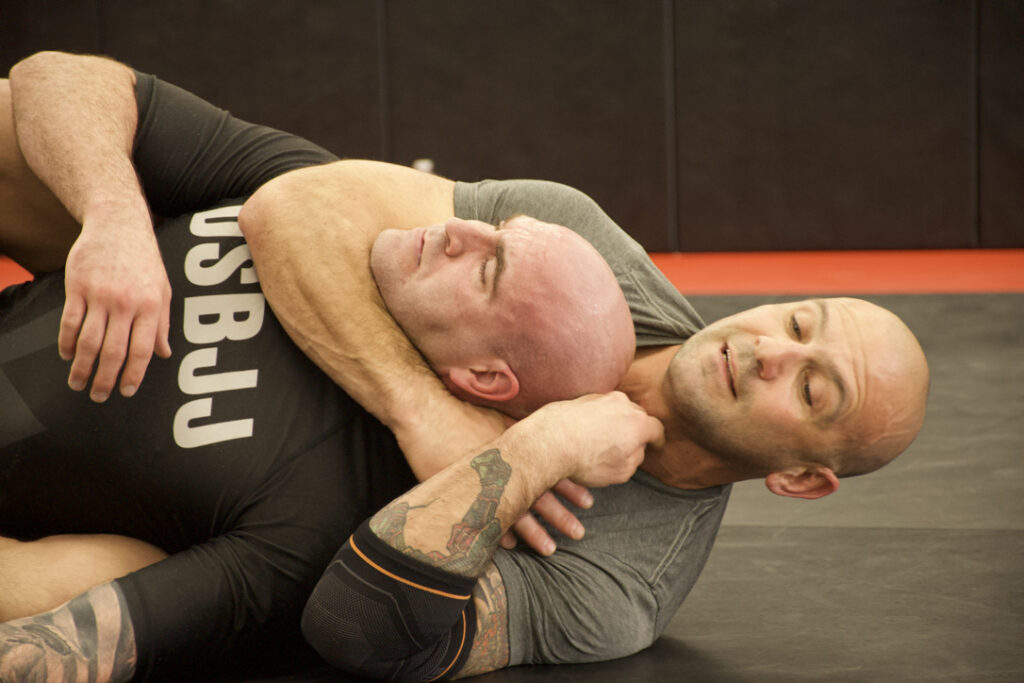Spring 2023
Rhode Island lieutenant starts state’s first BJJ program

Lieutenant Bryan Palagi is in his 12th year of service to the Tiverton Police Department in Rhode Island after graduating from the Rhode Island Municipal Police Training Academy (RIMPTA) in 2012. After serving both as an officer and supervisor, he is currently in charge of the Planning and Training Division.
In addition, he is a RIMPTA use of force instructor, designing a curriculum that’s been adopted by both the Providence Police and Rhode Island State Police academies.
Just prior to starting his policing career, Palagi began training in Brazilian Ju-Jitsu (BJJ) under Danny Slavery, a Tiverton police officer who had his own training academy in town before ultimately moving his operations to nearby Somerset, MA. Eventually earning his black belt, Palagi saw the benefits BJJ can offer officers in the field and effectively petitioned his chief to start the Ocean State’s first BJJ training program for police officers.
Palagi spoke with Tactical Training & Conditioning about starting the program and his advice for other departments considering a similar program.
Tactical Training & Conditioning: Why is Brazilian Ju-Jitsu a strong option for officers to learn hand-to-hand and restraint techniques?
Lt. Bryan Palagi: Policing is a challenging job, especially in today’s world. Officers are expected to end violent encounters while causing as little damage/injury as possible. Most of these encounters end on the ground. The simple reason for this fact is that officers can utilize the ground, their body weight, and gravity to help control a suspect’s movements and secure them in handcuffs. Although there is a plethora of other martial arts that have applications for law enforcement, BJJ teaches a practitioner how to control someone’s movements on the ground without a great deal of emphasis on striking and (depending on the level of confidence in his/her abilities) without the need to introduce weapons to the altercation.
TT&C: Why was it important to you for active officers to have the option to have hand-to-hand training like BJJ?
Palagi: Whenever an officer can safely take a suspect into custody without the introduction of weapons, there is a substantial decrease in the possibility that injury might occur as a result, which also lowers the possibility of lawsuits. Not only does BJJ help officers learn how to control a suspect and be more effective at their jobs but, it can also be used for self-defense. Learning about the application and effects of cardiovascular neck constraints (chokes), joint manipulations and so forth, can help an officer to recognize dangers they may encounter on the job, and address them accordingly.

The cardio required for fighting/grappling is very different from other types of cardio. In a physical altercation, you need to learn to control adrenaline, remember to breathe, and recognize when you can rest (usually in dominant positions). An avid runner who runs 20 or 30 miles a week or more might have the ability to last slightly longer in a physical altercation than an average person, but the ability to develop the cardio you need for fighting can only come from fighting. It is important for officers to understand this and learn their limits on the mats instead of in the streets.
TT&C: When researching a BJJ training program for the department, what feedback or information did you learn or receive from other departments across the country?
Palagi: When researching other programs, I started locally and contacted Weymouth (Massachusetts) PD who had recently started a program with Dedeco BJJ. I also looked at Pasco (Washington) PD and Marietta (Georgia) PD among others. I was able to make contact with Major Jake King of Marietta PD and he provided me with information and documents outlining his department’s program including their statistics to date. This was very helpful in the designing of our program in Tiverton.
TT&C: What does the Tiverton Police BJJ Program entail? And how has the department received it?
Palagi: Once an officer has expressed his/her interest in the BJJ program and obtains the Chief’s approval to participate, that officer has to complete at least four classes a month and can take up to eight. Their tuition is paid for by the town and they accrue an hour of comp time for every class attended.
BJJ is an intense art/sport that requires a great deal of commitment along with mental and physical toughness. It’s not for everyone and I knew before this program began that not every officer would want to participate or that every officer who did participate would stick with it forever. There are currently six officers (20% of the department) involved in the program. Most of the participants are younger and have a few years or less on the job. For many of them, their first interaction with BJJ was during the academy where approximately 60-70% of the techniques that are taught are based in BJJ.
TT&C: Since the program’s inception in July 2022, are there any quantitative results that show a difference that you can share with our audience?
Palagi: February 2023 marked eight months since the inception of our program. During that 8-month period, 10 different officers of approximately 30 sworn participated in the program and took a total of 178 classes with no reported injuries.
BJJ is a commitment and a lifestyle. Much like anything else, it’s not for everyone and some people don’t see the same benefit as others. Sometimes life, in general, is difficult to manage between work, family, etc., and finding time to exercise and concentrate on yourself isn’t always your first thought. Some officers from Tiverton PD participated in the program and decided that it wasn’t for them and withdrew after several months. At the same time, others started training and never stopped, they’re absolutely hooked which is a feeling I know all too well.
At this point in time, there hasn’t been enough data collected to draw some type of correlation between the training and use of force situations on the job. When I reached out to Marietta PD, they had been practicing BJJ as a department for approximately 18 months and it seemed like they were just getting to the point where they had enough data to do just that.
» ALSO SEE: When to Incorporate Interval & HIIT Workouts
TT&C: Do you have any plans for expansion in the future?
Palagi: Our Chief is big on training. I think that’s the reason why we were able to get this program approved. At this point, he has not denied access to any officer interested in participating. I hope that new officers who have just completed the academy will continue to get involved with the BJJ program. As we continue to hire, I’m sure the program will grow.
TT&C: What advice do you have for those considering starting a similar program for their department?
Palagi: One of the points I harped on when pitching this program is practicing BJJ regularly is a continuation of the training that our officers are receiving at the academy level. If your police department has a martial arts gym that would be a good fit for law enforcement training, reach out and see if the owner would be willing to partner with their local police. If you’re unsure if that particular art would be a good fit for law enforcement, speak with your use of force instructor or the instructors for your academy to find out. Do your research.
Word spreads fast. After we were featured on Police1, I had officers reaching out from New Hampshire, Massachusetts, and so forth asking about the program. If an officer is interested in bringing a similar program to their department, reach out to an agency that already has one and ask for some pointers, documents, and so forth.



